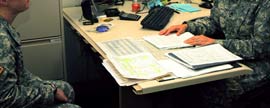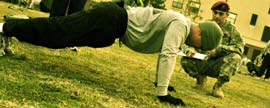With regard to missing and appointment and escorting the Soldier I cannot tell you what is appropriate. If you were directed to escort the Soldier and missed the appointment as a result of the direction/order, you most likely have a case against the Article 15. But this will be for a JAG representative to discuss with you.
You are correct they cannot backdate a counseling statement. They can reconstruct a counseling statement and ask that you sign it but you are under no obligation to do so. Please check out the following Q&As that may provide you additional information.
- Can a leader back date a counseling?
- Should I refuse to sign counseling statements I do not agree with?
- When do I fill out the assessment portion of the 4856?
- What do I do when a Soldier refuses to sign?
- Can my squad leader back date a counseling?
- What do I do when a Soldier checks disagree?
Counseling
With regard to not being counseled monthly or otherwise I am not sure it has any real bearing on the issue. While it is inappropriate that you have not be counseled regularly and it is something you could bring up during an Article 15 proceeding, it has no bearing on missing an appointment.
Leave as a benefit
With regard to leave. To my knowledge a Flag only stops advanced or excess leave. Normal leave is a benefit (meaning it is earned as part of your compensation), not an privilege. Therefore it can only be stopped in rare cases. For example, the command can disapprove leave if they could prove you are a flight risk for AWOL.
Therefore you most likely have a case to continue on your leave. I would encourage you to consult with the IG to ensure you are armed with the facts and then approach your chain of command.
Food for thought
Your chain of command has more important things to do then go after Soldiers. Most situations can be defused by approaching the chain of command in a professional and humble manner with open communication. In my experience when Soldiers approached me this way it did a lot to improve their position in the issue. Admit when you are wrong, be sincere, and move on. The only thing the command team is usually looking for is to correct substandard performance. If there are other motives it usually appears in the paperwork or lack of paperwork.
What is a flag?
AR 600-8-2 provides specifics about flags and I would encourage you to read it. Here are some extracts:
1–14. Actions prohibited by a flag
A flag properly imposed in accordance with this regulation prohibits the personnel actions listed below (see para 1–15 for exceptions). The PSC will control the if applicable to guard against accidental execution of—
a. Appointment, reappointment, reenlistment, and extension.
b. Entry on active duty (AD) or active duty for training (ADT).
c. Reassignment.
d. Promotion or reevaluation for promotion.
e. Awards and decorations.
f. Attendance at civil or military schooling.
g. Unqualified resignation or discharge.
h. Retirement.
i. Advanced or excess leave.
j. Payment of enlistment bonus (EB) or selective reenlistment bonus (SRB).
k. Assumption of command.
l. Family member travel to an oversea command (when sponsor is overseas).
m. Command sponsorship of family members in an oversea command (when sponsor is overseas).
1–15. Processing exceptions
a. APFT.
(1) Flags for APFT failure block promotion, reenlistment, and extension only.
(2) A flag is not initiated if the soldier has a limiting physical profile that specifically prohibits taking the APFT.
b. Weight control.
(1) Flags for weight control block only attendance at full-time civil or military schooling, promotion, awards and decorations, assumption of command, and reenlistment or extension.
(2) Soldiers attending a civil or military school on the date of the flag will not be removed from such schooling.
(3) Commanders may approve reenlistments and extensions under certain medical conditions as advised by the supporting total Army career counselor.
c. Reassignment.
(1) HQDA will reassign soldiers returned to military control from dropped from the rolls (DFR).
(2) Soldiers in receipt of HQDA reassignment instructions may depart when their case moves into the punishment phase if the punishment does not require the soldier’s continued presence.
(3) Major oversea commanders approve intra-command reassignments.
(4) Installation commanders approve intra-installation reassignments.
(5) Flagged soldiers may be reassigned if—
(a) The flag is based on APFT failure.
(b) The flag is based on entry in the weight control program.
(c) The flag case is in the punishment phase with no restraints on liberty imposed by civil court, court-martial, or
Article 15.
(d) Reassignment is deemed necessary by installation or major overseas commanders (within their command) for the maintenance of discipline, morale, and unit order.
d. Advance or excess leave.
(1) The General Court-Martial Convening Authority (GCMCA) may direct excess leave to soldiers sentenced by
court-martial to dismissal or a punitive discharge when the sentenced has not yet been approved.
(2) The GCMCA or designee may grant an indefinite period of excess leave to soldiers awaiting administrative discharge in accordance with AR 600–8–10.
(3) Commanders may grant advance or excess leave when emergencies exist.
e. Unqualified resignation, discharge, or retirement.Flagged soldiers may submit requests for consideration by
HQDA.
f. Entry on AD or ADT.
(1) Flagged ARNG and U.S. Army Reserve (USAR) soldiers may not apply for AD or ADT.
(2) HQDA may direct involuntary AD or ADT for flagged ARNG and USAR soldiers.
g. Awards and decorations.Retirement awards and decorations for valor may be processed and presented to flagged soldiers.
h. Erroneous flag will be declared void and of no effect.















Comments
TYRONE mCcARGO
my commander initiated an AR 15 against me. I demanded a Court Martial. My commander denied me a court martial. However, I was discharged from the army under Chapter 14-12c for misconduct. However, I have never received an AR 15, or court martial. I have never been found guilty of any misconduct. Is this legal?
Eck
Yes, it is legal. A Separation under AR 635-200 is an administrative procedure, whereas an Article 15 or Court Martial is punitive. Two totally separate issues even though many times they involved the same incident of misconduct.
I hope this helps.
Eck
Oscar
Well I got moved from the squad leader position and Im now in an NBC Room working as the NCOIC there. I wanted to take leave towards the end of may, some on june and some on july. I have not heard anything back from the investigation, but my current plt SFC told me that the packets stopped at 1sg and he didn’t want to sign off because of the investigation. But my Alpha team leader is under the same investigation and got to go on leave. We are both dealing with the same case. I checked the AR 600-8-10 and 600-8-2 but it doesn’t cover anything on denying leave. Can anyone help me pin point something that could put my mind at ease.
SGT NICK
AR 600-8-10 clearly states on denying leave on Table 12-2 page 80:
CDR: Approve or disapprove leave
Unit: If disapproved, state reason on DA Form 31, block 17, if not already stated by
recommending supervisor.
Your 1SG can recommend no but the cdr has the final say, which is probably no. The packet is suppose to be returned to you with a reason why it was disapproved written on either the cover sheet or the leave form itself. “pending investigation” would suffice.
Hope this helps!
Eck
Oscar,
Yes, you can be removed from leadership positions due to being under investigation. Since you are being investigated for Art 93, it is even more appropriate to remove you from that position at least temporarily. Once the investigation is complete two things should happen;
1) If the allegations are found to be unsubstantiated, then you should be returned to your leadership position;
2) If the allegations are substantiated, then you will be permanently removed from the position and potentially face any administrative or punitive actions your command deems appropriate. I am assuming you are an NCO, you would also face a “Relief for Cause” NCOER.
I hope you found this information useful.
Eck
“The views presented by the author are his own and do not necessarily represent the views of DoD or its Components.”
Disclaimer: I am not an attorney and any views presented are my own and are not to be interpreted as legal advice. Furthermore, my views do not necessarily represent the views of DoD or its Components.
Oscar
I’m being investigated under art93. And they told me yesterday that I could not be a sqd leader because of the investigation. Is that true?
pfc white
My name is PFC White, I am a soldier at camp carroll, korea
I have a signed DA31 from the BN Commander for OCONUS leave back to the states. I recently got in some trouble and am now being recommended for a battery level article-15. My DA31 has been signed since DEC. 14, 2012. Since im pending UCMJ, can i still take leave?
Mark Gerecht
PFC White,
That will need to be determined by your chain of command. They can deny and/or postpone your leave as a result of pending UCMJ action.
katie
I am an active duty soldier stationed in the states, due to have a baby next month. The father of my child is still in Korea because he is pending UCMJ. He was supposed to be able to take leave to be here for the birth of his child, but now they are trying to tell him no and that he is a ‘flight risk’. The prosecutor for his case has told the chain of command that he is not a flight risk, but they wont budge. Is there anything he can do to work around this? If the prosecutors are even working on his side, shouldn’t it be better? Thanks
SGT NICK
Because of the circumstances of your husband pending UCMJ the commander can deny leave if he believes that he will do harm to himself or others. When you have the child I would recommend sending a Red Cross message to his command requesting his presents at the hospital. If they refuse then I would file an official IG complaint with your chain of command AND his.
I do not know the circumstance for his case but if he is facing non-judicial punishment then they should let him go. If he is facing serious charges, which I assume cause you mention prosecutors and flight risk, then they will most likely not release him for ordinary/emergency leave unless the situation is dire. Summary/special/general Court-Martial would be pending UCMJ actions that would result in a denied leave form.
Congratulations on being a new mother and hopefully better times lie ahead.
*The views expressed are those of the author and do not reflect the official policy or position of the US Army, Department of Defense or the US Government.*
Mark Gerecht
Katie,
Here are the specifics of the Regulation.
AR 600-8-10, para 4–3. Rules to request ordinary leave
a. Soldiers are authorized, on the average, to take 30 days of leave a year. (Commanders may grant more than 30
days if operationally feasible.)
b. Ordinary leave is a chargeable leave granted in execution of the commander’s annual leave program (paras 2–2
and 4–1).
c. The unit commander or designee is the approval authority for ordinary leave requests.
As long as the commander can justify denying the leave approval, in this case he definitely can, then he is meeting the requirements of AR 600-8-10.
SPC Diaz
I’m undergoing an Investigation and want to know if I still have to go to NTC while flagged?
How many months can I be flagged for ? I was told it was six months at a time, but I am not sure what AR states it.
Mark Gerecht
While under investigation you will continue to perform your assigned duties unless the investigation involves loss of trust or confidence. In these cases the command will determine if your duties should be reassigned or modified based on the specifics of your situation. More than likely you will proceed to NTC unless there are extenuating circumstances. The flag will remain in effect until the investigation is complete and the appropriate action if any is taken. The regulation that governs flags is AR 600-8-2. You may also want to look into AR 600-37. Here is an extract of AR 600-8-2 with regard to flags.
1–12. Circumstances requiring a non-transferable flag
The specific actions and investigations listed below require a non-transferable flag.
a. Adverse actions.
(1) Charges, restraint, or investigation. Remove the flag when soldier is released without charges, charges are dropped, or punishment is completed.
(2) Court-martial. Remove the flag upon completion of punishment, to include any term of suspension. However, a flag for a soldier on a HQDA promotion list (officer promotable to 03–06, warrant officers promotable to CW3–CW5, and enlisted soldiers promotable to E7–E9) who is flagged for a court-martial, can only be removed by HQDA (AHRC-Alexandria-MSP-S). Forward a copy of the initial DA Form 268 along with supporting documentation to HQDA (AHRC-Alexandria-MSP-S).
(3) Nonjudicial punishment. Remove the flag upon completion of punishment, to include any term of suspension. However, a flag for a soldier on a HQDA promotion list (officer promotable to 03–06, warrant officers promotable to CW3–CW5, and enlisted soldiers promotable to E7–E9) who is flagged for nonjudicial punishment can only be removed by HQDA (AHRC-Alexandria-MSP-S). Forward a copy of the initial DA Form 268 along with supporting
documentation to HQDA (AHRC-Alexandria-MSP-S).
(4) Absent without leave (AWOL). Remove the flag upon completion of punishment.
(5) Administrative reduction.Remove the flag on the day of reduction.
(6) Memorandums of admonition, censure, or reprimand not administered as nonjudicial punishment. Remove the flag upon completion of filing instructions. However, a flag for a soldier on a HQDA promotion list (officer promotable to 03–06, warrant officers promotable to CW3–CW5, and enlisted soldiers promotable to E7–E9) who is flagged for one of these memorandums can only be removed by HQDA (AHRC-Alexandria-MSP-S). Forward a copy of the initial DA Form 268 along with supporting documentation to HQDA (AHRC-Alexandria-MSP-S).
(7) AMEDD soldiers who are not in compliance with AR 40–68. Remove the flag (code type E) on the date of
compliance.
b. Elimination—field initiated. Remove the flag when soldier is reassigned to a transition point.
c. Removal from a promotion, command, or school selection list—field initiated. A flag for a soldier on a HQDA promotion list (officer promotable to 03–06, warrant officers promotable to CW3–CW5, and enlisted soldiers promotable to E7–E9) who is flagged for removal from command, promotion, or school list can only be removed by HQDA (AHRC-Alexandria-MSP-S). Forward a copy of the initial DA Form 268 along with supporting documentation to
HQDA (AHRC-Alexandria-MSP-S).
d. A referred officer evaluation report (OER) when on a promotion list. Remove the flag when received and accepted by HQDA.
e. A security violation.
(1) Local security violation. Remove the flag upon direction of the commander.
(2) Violation of Title 18 of the United States Code concerning sabotage, espionage, treason, sedition, or criminal subversion.
(a) When case is closed favorably, remove the flag upon direction of the Commander, U.S. Army Central Personnel Security Clearance Facility (CCF).
(b) When case is closed unfavorably, remove the flag upon direction of the Secretary of the Army.
(3) Violation of Articles 94, 104, 106, 133, and 134 of the Uniform Code of Military Justice (UCMJ).Remove the flag upon direction from the Secretary of the Army.
f. Elimination or removal from promotion, command, or school selection list—HQDA initiated. HQDA will remove the flag.
1–14. Actions prohibited by a flag
A flag properly imposed in accordance with this regulation prohibits the personnel actions listed below (see para 1–15
for exceptions). The PSC will control the if applicable to guard against accidental execution of—
a. Appointment, reappointment, reenlistment, and extension.
b. Entry on active duty (AD) or active duty for training (ADT).
c. Reassignment.
d. Promotion or reevaluation for promotion.
e. Awards and decorations.
f. Attendance at civil or military schooling.
g. Unqualified resignation or discharge.
h. Retirement.
i. Advanced or excess leave.
j. Payment of enlistment bonus (EB) or selective reenlistment bonus (SRB).
k. Assumption of command.
l. Family member travel to an oversea command (when sponsor is overseas).
m. Command sponsorship of family members in an oversea command (when sponsor is overseas).
Did you find this information useful? We appreciate your feedback!
TOP
Eck
CSM provides some valuable information. In regards to ordinary leave though, IAW AR 600-8-10, Leaves and Passes, Paragraph 4-3c states, “The unit commander or designee is the approval authority for ordinary leave requests.”
Under this paragraph, it is the commander’s discretion whether to authorize leave or not. My experience has shown that many commanders will deny leave when a Soldier is pending UCMJ action.
Disclaimer: I am not an attorney and any views presented are my own and are not to be interpreted as legal advice. Furthermore, my views do not necessarily represent the views of DoD or its Components.